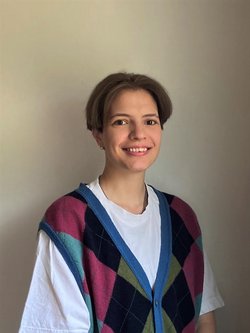
What is your workplace and job title?
I am a data linguist at the software company Vitec MV. We develop the software IntoWords which is an assistive reading and writing tool for people with dyslexia.
What are two or three examples of daily tasks?
As a data linguist, data handling is a big part of my daily tasks. I collect and preprocess linguistic data, ensuring its quality and compatibility for analysis. I contribute to the development of effective assistive reading and writing technology for dyslexic people by integrating the data into our software's backend systems and performing analysis and modeling. This also includes developing tools for data collection and preprocessing.
Another one of my tasks is developing our grammar correction feature. This involves researching grammar rules, designing algorithmic solutions, training and fine-tuning models, and testing and evaluating the tools. By delving into language structures, I ensure accuracy and reliability in the grammar correction process. Collaborating with software developers and data scientists, we provide a tool that offers automated suggestions for improving grammar and enhancing written communication for dyslexic individuals.
What are the two or three main things you got from linguistics?
Firstly, I have gained an in-depth understanding of language structure, encompassing phonetics, morphology, syntax, semantics, and pragmatics. This knowledge enables me to analyze and process linguistic data accurately within our software.
Secondly, I have developed skills in linguistic data processing and analysis, allowing me to parse, segment, and extract relevant information from various types of linguistic data. These skills are essential in implementing linguistic features and algorithms in our software – for instance word prediction, grammar correction and text-to-speech.
Lastly, linguistics has provided insights into the language-related challenges specific to dyslexia, enabling me to develop targeted solutions that address decoding, sentence structure, and phonological processing difficulties. Overall, my background in linguistics has equipped me with a deep understanding of language, proficiency in linguistic data processing, and valuable insights into dyslexia, enhancing my ability to develop effective software for dyslexic individuals.